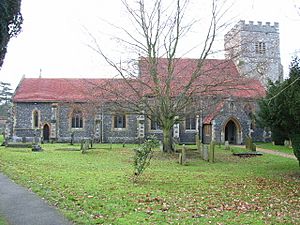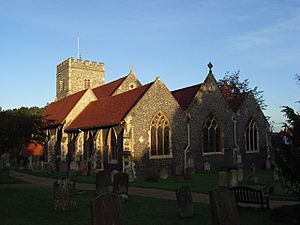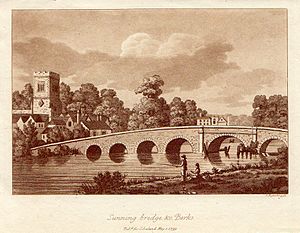St Andrew's Church, Sonning facts for kids
Quick facts for kids St Andrew's Church |
|
|---|---|
| The Parish Church of St Andrew | |

St Andrew's Church from the north
|
|
| OS grid reference | SU 75588 75571 |
| Location | Sonning, Berkshire |
| Country | England |
| Denomination | Church of England |
| History | |
| Status | Active |
| Architecture | |
| Functional status | Parish Church |
| Heritage designation | Grade II* |
| Designated | 26 January 1967 |
| Style | Victorian Gothic |
| Years built | 1852–3, 1876, etc. |
| Administration | |
| Parish | Parish of Sonning |
| Deanery | Deanery of Sonning |
| Archdeaconry | Archdeaconry of Berkshire |
| Diocese | Diocese of Oxford |
St Andrew's Church is a special old church in the village of Sonning, England. It sits right by the River Thames in Berkshire. This church is famous for its beautiful old monuments. It is also important because it was built where an even older Anglo-Saxon cathedral once stood. It is a Church of England parish church, which means it serves the local community.
Contents
Where is St Andrew's Church Located?
The church is in a central spot in Sonning village. It is very close to where the historic Bishop's Palace used to be. Today, only some grassy mounds show where the palace once stood.
Nearby Historic Buildings
Right next to the church, away from the river, is the old Bull Inn. The church actually owns this historic building. Also next to the churchyard are Deanery Gardens. This is a house from the early 1900s designed by Edwin Lutyens. It has a beautiful garden created by Gertrude Jekyll. High walls hide the garden, but you can get a good view from the top of the church tower.
Sonning Bridge and the River Thames
Close by is the brick-built Sonning Bridge. This bridge crosses the Thames into Oxfordshire. Next to the bridge, on the river, is the Great House at Sonning. This used to be a historic public house and is now a hotel and restaurant.
History of St Andrew's Church
Sonning was once home to an early Saxon minster. A minster was a type of church or monastery. In 909 AD, this minster became one of two cathedrals for the See of Ramsbury and Sonning. You can still see some Saxon stonework in the church today. This shows how old parts of the building are.
How the Church Changed Over Time
The north side of the church, called the north aisle, was built in the 1200s. The south aisle was added in the early 1300s. However, most of the church you see today looks Victorian. This is because it had big restorations (major repairs and changes) in 1852–53 and 1876. These changes were led by Henry Woodyer.
Notable Features and Monuments
One interesting feature is a fancy monument from the 1600s dedicated to Sir Thomas Rich, 1st Baronet. It is now hidden at the bottom of the tower. In 1853, some people thought it looked "pagan." The church also has many beautiful memorial brasses. These are special metal plaques that remember people. Most of them are under the carpet. St Andrew's Church is a Grade II* listed building. This means it is a very important historic building.
Important People in the Church's History
Hugh Pearson was a well-known vicar at the church during the Victorian era. Many of the changes to the church happened while he was there. The village hall, Pearson Hall, and Pearson Road are named after him.
People Buried at St Andrew's Church
Many people have been buried at St Andrew's Church over the centuries. Some are in the churchyard, and others are inside the church itself.
Burials in the Churchyard
- Edmund John Phipps-Hornby (1857–1947): He received the Victoria Cross, a very brave award.
- Major General Llewelyn Alberic Emilius Price-Davies (1878–1965): Another person who received the Victoria Cross.
- Brigadier Sir Neil Hamilton Fairley (1891–1966): An Australian doctor and soldier.
Burials Inside the Church
- John Blagrave (major)
- Robert Wright (bishop)
- Sir Thomas Rich, 1st Baronet
- William Scott, 1st Baron Stowell
- Robert Palmer (MP)
- Hugh Pearson



